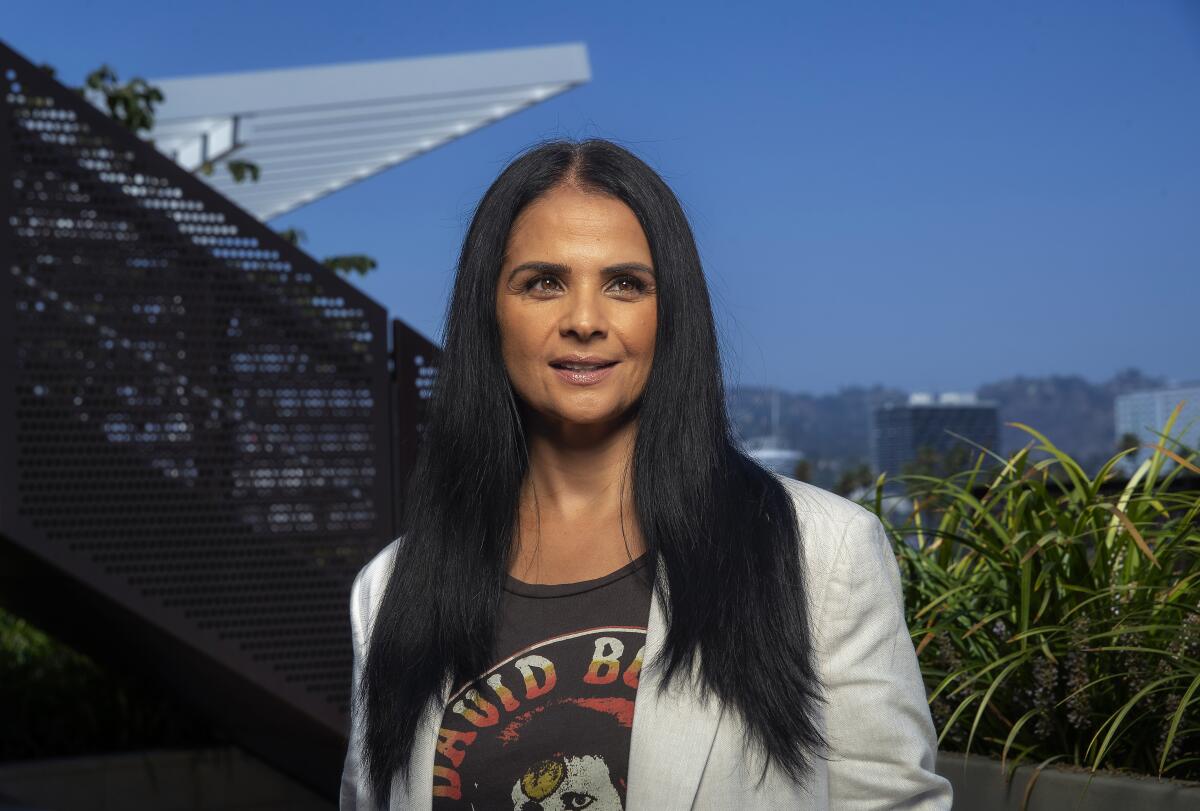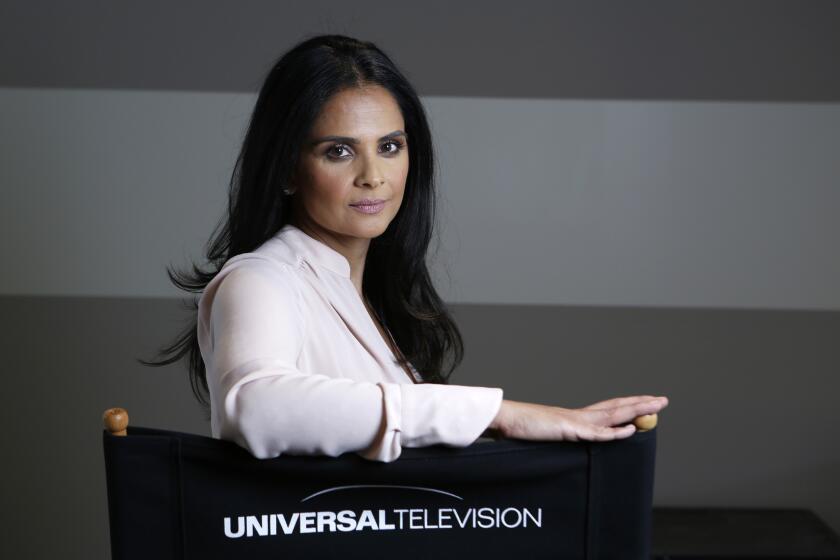Netflix’s foreign-language shows are booming. Meet the executive behind the streamer’s global push

After Netflix executive Bela Bajaria watched a 2017 documentary called “A Suitable Girl,” about arranged marriages in India, and spoke with one of its directors, something clicked.
Her parents had once organized dates for Bajaria with potential suitors, and she knew the stakes were much higher than what’s seen on typical U.S. dating shows — family drama, clashing cultural traditions and suspense over whether the couple will marry. Bajaria felt such tension was worth exploring in a reality series.
She discussed the idea with one of the documentary’s filmmakers, Smriti Mundhra, and the result was “Indian Matchmaking.” The reality show, which premiered last year, follows the lives of Indians and Indian Americans as they navigate dating with the help of a matchmaker.
The unscripted series in English and Hindi was a hit, watched by a quarter of Netflix’s members in India and millions of subscribers outside of India in its first four weeks.
“I understood that push-pull of America and love and arranged marriages and what that means, and so that Indian matchmaker show I really understood on a deeper level,” Bajaria said. “I understood when my parents asked me to do it, even though I fought with them about it.”
‘Indian Matchmaking’ joins Netflix’s growing stable of dating shows like ‘Love Is Blind’ and ‘Too Hot to Handle’ while taking on arranged marriage stereotypes.
The success of “Indian Matchmaking” and other popular shows championed by Bajaria led to her promotion last year as head of global TV at Netflix, where she oversees the team that handles TV content for Netflix’s more than 209 million global subscribers.
Bajaria has played a pivotal role in helping Netflix generate large audiences for its non-English-language original series, reality shows and programs that feature talent from underrepresented communities.
Netflix has made shows in 40 countries; 97% of its U.S. subscribers watched at least one non-English title in the last year. Bajaria has supported series ranging from Mexican thriller “Who Killed Sara?” to German drama “Barbarians,” about the Battle of Teutoburg Forest.
Later this year, the streamer will roll out the second season of popular fantasy series “The Witcher” based on novels and stories by a Polish author and what Bajaria predicts will be a big show — “Cowboy Bebop,” starring Asian American actor John Cho, a live-action version of the popular Japanese anime series.
The global focus reflects the geography of Netflix’s membership. Only 35% of its subscribers are from the U.S. and Canada.
What’s more, Netflix faces pressure to keep adding content as Disney+, HBO Max and other streaming rivals grab market share. The number of Netflix customers surged at the beginning of the pandemic as people looked for ways to entertain themselves at home, but the pace has slowed in the last quarter.
Netflix is “years ahead of its peers with this strategy,” wrote Jeff Wlodarczak, a principal and senior analyst with Pivotal Research Group in an email. “It gives them a definite edge in many markets, and the more global subscribers they generate, the more they can invest in local content.”
Netflix signaled its commitment by promoting Bajaria last year from her previous role of overseeing local-language originals. The shakeup led to the departure of Cindy Holland, longtime original content vice president, who oversaw multimillion-dollar deals with major U.S. showrunners and such hits as “Stranger Things” and “The Crown,” which won 11 awards including best drama series as Netflix dominated the 2021 Emmys.
Bajaria restructured the TV department, putting exclusive deals with writers under one group, to give them more personalized attention.
Although Netflix continues to make deals with prominent talent — most recently with “Power” creator Courtney Kemp and “Schitt’s Creek” creator Dan Levy — some Hollywood insiders believe the company is shifting away from big talent deals as it pivots more heavily overseas.
Bajaria disputes that idea.
“Hollywood’s always a great place to tell stories — that hasn’t changed,” Bajaria said. “To me, it’s just an expansion of the sort of storytelling and creativity and an opportunity for people to tell stories who haven’t gotten to tell stories on that global scale.”
Netflix executive Vernā Myers shares how the streamer improved Black representation at the company and the efforts it is making to improve diversity on its shows and staff.
In the past year, Netflix opened offices abroad in cities including Stockholm; Bangkok, Thailand; Copenhagen; and Istanbul, Turkey. It is growing rapidly in South Korea, India and Japan.
Bajaria gives wide latitude to local executives in these offices to greenlight shows in their respective countries. She regularly meets with them in video conferences to discuss slates and budgets. Netflix invested $1 billion in the U.K. last year and $400 million in India in 2019 and 2020 alone.
“We just want shows to represent the world as it is,” Bajaria said. “I think local executives in these countries matter, understanding the creative community, understanding the audience — that matters.”
Local-language shows have the potential to become global hits like “Lupin,” which was inspired by the classic French character Arsène Lupin.
The series, about a Black thief who seeks to avenge the death of his father, a Senegal immigrant, was the most popular show launched on Netflix so far this year. Race plays a significant role in the series — Lupin’s Blackness makes him harder to track as he disguises himself as an overlooked janitor or food delivery person.
Bajaria worked closely with Netflix’s France team as they refined the script and made key casting decisions, including landing critically acclaimed actor Omar Sy for the lead.
“We wanted it to feel relevant in 2021,” Bajaria said. “We wanted it to feel (like) something that at least had a different kind of take and an energy to it.”
Netflix reported earnings for the second quarter that were worse than expected.
Bajaria’s affinity for international stories comes naturally. She came to Los Angeles when she was 8 after spending parts of her childhood in London and Zambia.
“I grew up in the U.S. as an Indian girl that never saw myself really kind of anywhere, and definitely not onscreen,” Bajaria said. “That can be isolating and confusing. ... The idea of representation and telling stories from lots and lots of different backgrounds is really important.”
Bajaria, 50, is one of the few prominent Indian American studio executives in Hollywood.
Before joining Netflix in 2016, she was president of Universal Television, the first woman of color to lead a studio. She was credited with reenergizing the business, selling hit shows to other platforms including Mindy Kaling’s romantic comedy series “The Mindy Project” and the sitcom “Unbreakable Kimmy Schmidt.” Former NBC Entertainment chief Robert Greenblatt orchestrated Bajaria’s firing amid internal criticism that she was not developing enough successful shows for NBC.
“Getting fired was a painful thing to go through, especially after building a successful studio,” Bajaria said. “You can get knocked down and get back up again — not only survive but thrive too.”
The gig: Bela Bajaria is president of Universal Television, NBCUniversal’s TV studio that produces shows such as “Law & Order: SVU,” “The Mindy Project,” “Brooklyn Nine-Nine,” “Bates Motel,” “Unbreakable Kimmy Schmidt,” and soon, “Emerald City.”
At Netflix, Bajaria built on her relationship with Kaling, encouraging her to bring “Never Have I Ever,” a romantic comedy about an Indian American high school student in Sherman Oaks, to the streaming service. Netflix recently renewed the show for a third season.
Kaling credited Bajaria and Brooke Kessler, director of comedy series, for encouraging her to make the show after reading Kaling’s books and connecting to the stories of her childhood.
“I didn’t necessarily see a show there until they pointed it out,” Kaling said in an email. “That gave me the confidence to create the world. That kind of excitement about something that had never been on television — an Indian American family set around a teenage girl — really impressed me. The show’s success is so much about their belief in the concept.”
Critic Lorraine Ali writes of seeing her immigrant upbringing in the San Fernando Valley reflected in the Mindy Kaling Netflix comedy ‘Never Have I Ever.’
Kaling said she first met Bajaria when she was a writer on “The Office” and Bajaria made the deal to have “The Mindy Project” picked up by Hulu after it was canceled at Fox.
“Bela is extremely talent-friendly and has great taste,” Kaling said. “At the same time, though, she’s direct about what she likes and doesn’t like.”
“Never Have I Ever” breaks stereotypes with its Indian American heroine, Devi Vishwakumar, dealing with anger issues from her dad’s sudden death while balancing a stellar academic record, an overprotective mom and crushing on boys.
Bajaria said she sees parallels between her own upbringing in Southern California and Devi’s journey through Sherman Oaks High School. Bajaria now lives in Los Angeles with her husband, who is a writer and works in real estate, and three children.
“I can’t even imagine what it would have been like to have a show like ‘Never Have I Ever’ when I was a teenager, to actually see my conflicts normalized through this,” Bajaria said. “I can’t imagine it because it didn’t exist, but I’m so glad that we get to do that in so many other shows in a way for people to feel seen.”
More to Read
Inside the business of entertainment
The Wide Shot brings you news, analysis and insights on everything from streaming wars to production — and what it all means for the future.
You may occasionally receive promotional content from the Los Angeles Times.













